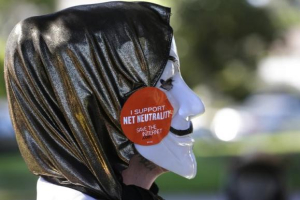In a ruling that could reshape the way the Internet works in the United States, the Federal Communications Commission will vote on Thursday whether or not to enforce the concept of Net Neutrality, which many Christian organizations support. It also brought up some unusual alliances.
According to Emily Baxter and Aseem Mehta of Religion & Politics, five FCC commissioners will vote Thursday on FCC Chairman Tom Wheeler's plan, which would involve reclassifying the Internet as a public utility like water or electricity under Title II of the Telecommunications Act of 1934.
"This legal maneuver will enable the FCC to prohibit Internet Service Providers (ISPs) from censoring or prioritizing content or charging additional fees to some websites and video-streaming services," Baxter and Mehta wrote.
Religion & Politics argued that despite the technical nature of the issue, religious activists and organizers had a role to play in the debate surrounding Net Neutrality.
"While largely Christian, religious groups have brought together strange bedfellows of progressive, faith-based activists and conservative religious organizations, from the Christian Coalition of America and the United Church of Christ to the United States Conference of Catholic Bishops," Baxter and Mehta wrote. "All have spoken out for net neutrality, even if they do not necessarily share arguments or coalition actions."
The Christian Coalition stated on its website that a lack of net neutrality could shut out conservative voices.
"What if a cable company with a pro-choice Board of Directors decides that it doesn't like a pro-life organization using its high speed network to encourage pro-life activities?" the organization asked. "Under the new rules, this could happen - and it would be legal!"
According to Paul Loeb of the Huffington Post, the issue of Net Neutrality made an unlikely alliance between the Christian Coalition and MoveOn.org. Both organizations have widely different political objectives; MoveOn supports progressive values, while conservative religious activists supported the Christian Coalition.
"When it comes to protecting Internet freedom, the Christian Coalition and MoveOn respectfully agree," an ad published in the New York Times stated.
Loeb reported that this unconventional form of cooperation started when Christian Coalition president Roberta Combs met with MoveOn co-founder Joan Blades in a gathering back in December 2005. Even though their political views were different, Blades became instant friends with Combs' daughter, Michele.
"We connected just talking the way women do," Michele Combs said. "We have lots of commonalities."
According to Loeb, Blades then floated the idea to Michele about conducting a joint political effort to save Net Neutrality, which was defined as "the right to keep the Internet available as an open commons for all." Both organizations worked together to keep that concept alive.
"The Internet had developed that way from the beginning, with all content having equal access and phone and telecom companies supplying the physical routes for data to travel, but not being allowed to favor or disfavor particular websites, applications, or data," Loeb wrote in explaining Net Neutrality. "But as high-speed Internet use took off, AT&T, Verizon, Comcast, and TimeWarner lobbied to control all that their media carried. This could let them auction off the right for websites or applications whose owners wanted them to load faster, while relegating other sites to second-class service."
Loeb added that this shift "would have devastated nonprofits, small businesses, and all kinds of political advocacy groups, which couldn't afford the rates that the most lucrative sites could pay."
"The telecom companies would also be able to control any content they chose, as when Verizon refused to distribute a text message alert from NARAL Pro Choice America and AT&T muted singer Eddie Vedder's criticism of President Bush during a live Pearl Jam webcast," Loeb wrote.
According to Loeb, the telecom companies were able to get the FCC, which was under the Bush administration, to eliminate the requirement that all content providers be treated equally back in August 2005. However, after the House passed a bill confirming the elimination of Net Neutrality in spring 2006, many organizations from all sides of the political spectrum rose up to block similar legislation in the Senate, including Christian Coalition and MoveOn.
"If we'd just done this with other conservative groups, it wouldn't have had nearly the impact," Michele said.
Blades agreed with Michele, adding that it was "nice to not always be predictable."
"When MoveOn shows up, people expect what we're going to say," Blades said. "But when MoveOn and the Christian Coalition show up together, people think, 'If these guys can agree on this, maybe it's something I should pay attention to.' You get a totally different response".
Loeb argued that without the friendship between Blades and Michele, Net Neutrality may have disappeared much sooner from cyberspace.
"I think it's America at its best when you come together like this," Michele said. "At the end of the day everyone wants to make a better country for their families, for the future. When we talk basic values, there's a lot we come together on."


















